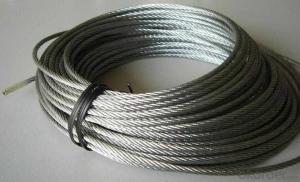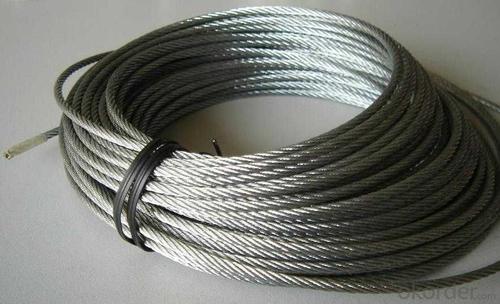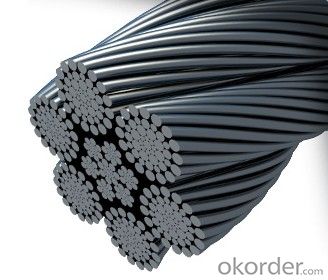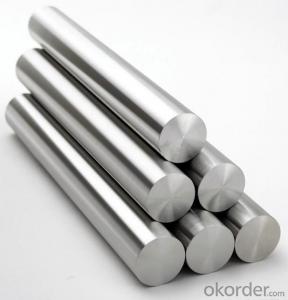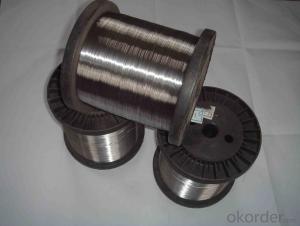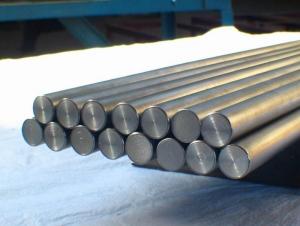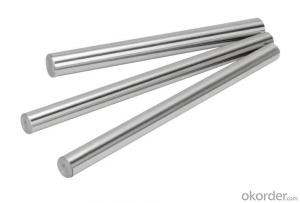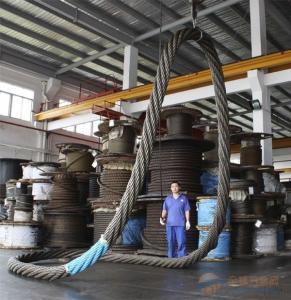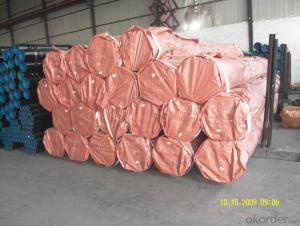302 Stainless Steel Wire Rope Hot Sale and High Quality
- Loading Port:
- Shanghai
- Payment Terms:
- TT OR LC
- Min Order Qty:
- 100 m.t.
- Supply Capability:
- 5000 m.t./month
OKorder Service Pledge
OKorder Financial Service
You Might Also Like
Specifications
304 stainless steel wire rope
- Grade: 300s,400s,200s.
- Main advantage grade: 304,304L,316,316L etc.
- Standard:AISI,ASTM,DIN,GB,JIS,CSA,AS,API,BS,IEC,CSA..
- Certification: ISO9001
- Dimeter: 0.15mm-60mm.
- Length: 200m/reel,305m/reel,500m/reel,1000m/reel,1525m/reel etc.
- Construction:1X7,1X19,6x7,7X7,6x19,7X19,6X37,7X37,8x19,19X7 etc. Many constructions to meet your requirements.
- Surface: galvanized (Electro & hot-dip)/ungalvanized , CoatedPVC/PE/NYLON steel wire rope etc.
- Technique: Hot/Cold Rolled.
- Twist Direction: RHRL,RHLL,LHRL,LHLL.
- Nominal Tensile Strength:1,570Mpa;1,670Mpa;1,770Mpa;1,870Mpa etc.
- Application:Crane cable,Trucker cable,Ship cable,Aircraft cable,Automobile clutch cable,Control cable,Telecommunication.Elevators,woven wire sieve,handcraft,Wire drawing office equipment,Electrical home appliances and raw material,Clocks and watches,Mechanical equipment,Hardware components,etc.
- Packing:Safety export wooden/plastic reel/as the requirement of customer.
- Q: Who knows what is the difference between double submerged arc welded pipe and longitudinal submerged arc welding?
- Double submerged arc welding is also a kind of longitudinal submerged arc welding.
- Q: What material is RHS in the steel tube?
- The CHS structure represents thin-walled round steel tubes, in which materials are referred to Taiwan CHS's steel and are used to indicate the series of anti rust paints used in metal materials.
- Q: How are steel pipes coated for aesthetic purposes?
- Steel pipes can be coated for aesthetic purposes in several ways. One common method is through the application of a powder coating. Powder coating involves spraying a dry powder onto the surface of the steel pipe and then heating it to create a durable and attractive finish. This process allows for a wide range of color options and provides a smooth, even coating. Another method used for aesthetic coating is electroplating. Electroplating involves immersing the steel pipe in a solution containing metal ions, such as chrome or zinc, and passing an electric current through it. This causes the metal ions to bond with the surface of the pipe, creating a thin, decorative layer. Electroplating can produce a variety of finishes, including shiny, reflective surfaces or more matte, textured appearances. Painting is also a common method for coating steel pipes for aesthetic purposes. This involves applying a liquid paint or enamel to the surface of the pipe. By choosing different colors, textures, and finishes, painting allows for a wide range of aesthetic possibilities. However, it is important to ensure that the paint used is specifically formulated to adhere to metal surfaces and withstand the environmental conditions the pipe will be exposed to. In addition to these methods, steel pipes can also be coated using techniques such as hot-dip galvanizing or metal cladding. These processes involve the application of a layer of another metal, such as zinc or aluminum, to the surface of the steel pipe. This not only enhances the appearance of the pipe but also provides protection against corrosion, extending its lifespan. Overall, there are multiple methods available for coating steel pipes for aesthetic purposes. Each method offers its own advantages and can be chosen based on the desired appearance, durability, and environmental conditions. It is important to consider factors such as color, texture, finish, and protective properties when selecting the coating method to ensure the desired aesthetic result is achieved.
- Q: How do steel pipes compare to other types of piping materials?
- Steel pipes are widely considered to be one of the most durable and strong types of piping materials available. They offer superior strength, resistance to corrosion, and can withstand high pressure and extreme temperatures. Compared to other materials such as PVC or copper, steel pipes have a longer lifespan and are more suitable for heavy-duty applications. Additionally, steel pipes are highly recyclable, making them an environmentally friendly choice.
- Q: What are the advantages of using steel pipes in the mining industry?
- One of the key advantages of using steel pipes in the mining industry is their exceptional strength and durability. Steel pipes can withstand high-pressure environments, heavy loads, and harsh conditions commonly found in mining operations. Additionally, steel pipes are resistant to corrosion, which is vital in mining where water and other chemicals are often present. Moreover, steel pipes offer excellent thermal conductivity, allowing for efficient transportation of fluids, such as water or slurry, crucial for mining processes. Lastly, steel pipes are relatively easy to install and maintain, making them a preferred choice for mining projects.
- Q: Can steel pipes be used for signposts or street lighting poles?
- Yes, steel pipes can be used for signposts or street lighting poles. Steel pipes are often chosen for their durability, strength, and resistance to harsh weather conditions, making them suitable for supporting signs or street lighting fixtures.
- Q: Are steel pipes suitable for solar power plants?
- Yes, steel pipes are suitable for solar power plants. They are commonly used in various applications within the plant, such as carrying water for cooling systems and transporting steam in concentrated solar power (CSP) plants. Steel pipes offer durability, strength, and resistance to corrosion, making them a reliable choice for the demanding conditions of a solar power plant.
- Q: Are steel pipes suitable for high-temperature applications?
- Yes, steel pipes are suitable for high-temperature applications. Steel has excellent heat resistance properties and can withstand high temperatures without deformation or structural failure. Additionally, steel pipes can be specifically designed and coated to enhance their heat resistance, making them ideal for various industrial processes and applications involving high temperatures.
- Q: What are the future trends in steel pipe manufacturing?
- Some future trends in steel pipe manufacturing include the use of advanced technologies such as robotic automation and artificial intelligence for increased efficiency and precision. There is also a growing focus on sustainability, with the development of eco-friendly manufacturing processes and the use of recycled materials. Additionally, there is a shift towards producing pipes with higher strength and lighter weight, as well as an increasing demand for customized products to meet specific industry requirements.
- Q: What are the safety measures to be followed while working with steel pipes?
- When working with steel pipes, it is important to follow several safety measures to ensure the well-being of workers and prevent accidents. Some of the key safety measures include: 1. Personal Protective Equipment (PPE): Workers should always wear appropriate PPE, including safety glasses, steel-toed boots, gloves, and hard hats to protect themselves from potential hazards. 2. Proper Lifting Techniques: Steel pipes can be heavy, so workers should use proper lifting techniques, such as bending their knees and using their leg muscles, to prevent strain or injury to their back. 3. Secure Storage and Handling: Steel pipes should be stored in a secure and organized manner to prevent them from falling or causing any hazards. Workers should also use appropriate lifting equipment, such as cranes or forklifts, to handle heavy steel pipes safely. 4. Inspect Pipes for Defects: Before working with steel pipes, they should be inspected for any defects, such as cracks or corrosion, that could compromise their structural integrity. Damaged pipes should be replaced to avoid potential accidents. 5. Proper Welding and Cutting Techniques: When welding or cutting steel pipes, workers should follow proper techniques and use appropriate safety equipment, such as welding masks and fire-resistant clothing, to prevent burns, fires, or explosions. 6. Fall Protection: When working at heights or on elevated platforms, workers should use fall protection equipment, such as harnesses and safety nets, to prevent falls and injuries. 7. Adequate Ventilation: In enclosed spaces where welding or cutting activities take place, proper ventilation should be ensured to prevent the accumulation of harmful fumes or gases. 8. Fire Prevention: Steel pipes can be flammable, especially when cutting or welding. Therefore, it is crucial to have fire prevention measures in place, such as fire extinguishers and fire blankets, and to follow proper fire safety protocols. By adhering to these safety measures, workers can minimize the risks associated with working with steel pipes and create a safer working environment.
Send your message to us
302 Stainless Steel Wire Rope Hot Sale and High Quality
- Loading Port:
- Shanghai
- Payment Terms:
- TT OR LC
- Min Order Qty:
- 100 m.t.
- Supply Capability:
- 5000 m.t./month
OKorder Service Pledge
OKorder Financial Service
Similar products
Hot products
Hot Searches
Related keywords
